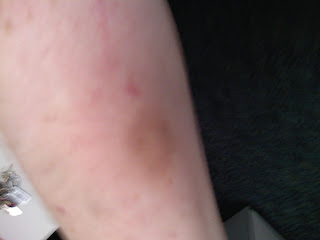
It's April, which means Autism Awareness Month. It's the month when we change our Facebook profile pictures to autism graphics, the month when we wear autism pins on our lapels. We wear puzzle piece buttons with pride, wanting to share autism with the world.
But how much can someone learn from a button, really? I mean, can a graphic of a puzzle piece really tell anyone anything about my sons? I don't think so.
It's spring in Arizona, which means the temperatures are close to 90 degrees. It's the time of the year when I get creative in my dressing, wearing lightweight long-sleeved shirts or toting along a lightweight cardigan to put on when I have to interact with someone (especially at work). It's a masking game I play, I suppose.
Tonight as I sat in my office, it was too warm to keep the sweater on, though I figured I could throw it back on if one of the tutors had to come in to talk to me. As I sat there at the table, I looked at my arms, my living autism awareness buttons.
It's my right arm, mostly--that's the one Nick prefers. It's covered in scars, scratches, and bruises. When people see it, they usually say nothing, though others ask about my cat. I usually let them think it is my cat, rather than telling them the truth.
My son *loves* me, more that he loves anyone in the universe. And because he loves me, he wants to experience me. A typical child might just snuggle next to mom to satiate the need Nick has, but his sensory system is under-responsive; he simply wouldn't feel anything from a gentle snuggle. He wants to pinch me and bite me--hard--so that he can feel and experience me.
Yes, I'm doing all the things the so-called experts have told me to do. Behaviorists say to ignore the behavior to extinguish it, but that doesn't work for Nick--I mean, it's not like he's doing the behavior to get a reaction from me, so the whole principle doesn't apply here. I am having some success with replacement behaviors--I'm teaching him to squeeze instead of pinch and to give super-hard kisses instead of biting. And he likes to push his forehead into mine to get that physical sensation he seeks. Slowly, we're replacing the destructive with the acceptable, but it takes time.
And so, for now, my arms carry the scars of my son's love, tokens that most parents never get to carry with them as reminders of how much their children love them. I think that for Autism Awareness Month I shall just wear the scratches and bruises uncovered as my autism awareness button. Perhaps not as pretty as a colorful puzzle piece, but far more accurate.
